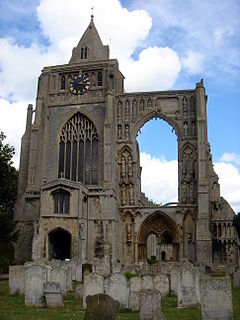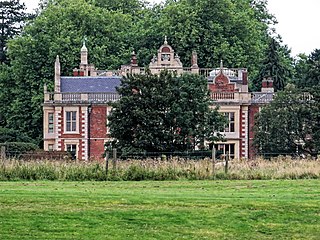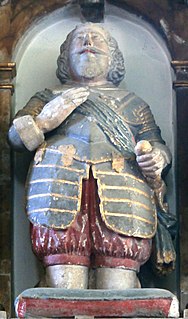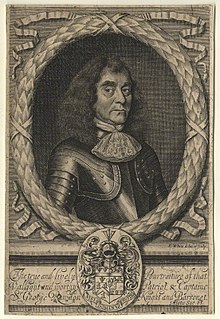
Crowland or Croyland is a town in the South Holland district of Lincolnshire, England. It is situated between Peterborough and Spalding. Crowland contains two sites of historical interest, Crowland Abbey and Trinity Bridge.

The New Model Army was a standing army formed in 1645 by the Parliamentarians during the First English Civil War, then disbanded after the Stuart Restoration in 1660. It differed from other armies employed in the 1638 to 1651 Wars of the Three Kingdoms in that members were liable for service anywhere in the country, rather than being limited to a single area or garrison. To establish a professional officer corps, the army's leaders were prohibited from having seats in either the House of Lords or House of Commons. This was to encourage their separation from the political or religious factions among the Parliamentarians.

Edward Montagu, 2nd Earl of Manchester, KG, KB, FRS was an important commander of Parliamentary forces in the First English Civil War, and for a time Oliver Cromwell's superior.

Edmund Calamy was an English Presbyterian church leader and divine. Known as "the elder", he was the first of four generations of nonconformist ministers bearing the same name.

Spalding is a market town on the River Welland in the South Holland district of Lincolnshire, England. Little London is a hamlet directly south of and contiguous with Spalding on the B1172, whilst Pinchbeck is a village almost contiguous, to the north. Spalding had a population of 31,588 at the 2011 census and this was estimated to have increased to 36,737 in 2020 according to government data, an increase of 1.6%.

Crowland Abbey is a Church of England parish church, formerly part of a Benedictine abbey church, in Crowland in the English county of Lincolnshire. It is a Grade I listed building.

Sir Thomas Barrington, 2nd Baronet, 1585 to 18 September 1644, was an English politician and Puritan activist who sat in the House of Commons at various times between 1621 and 1644. In the early stages of the First English Civil War, he helped establish the Eastern Association, one of the most effective elements of the Parliamentarian army.

Philip Nye was a leading English Independent theologian and a member of the Westminster Assembly of Divines. He was the key adviser to Oliver Cromwell on matters of religion and regulation of the Church.
Sir Andrew Agnew, 2nd Baronet was a Scottish parliamentary shire commissioner for Wigtownshire and Sheriff of Kirkcudbright.

Obadiah Sedgwick (1600?–1658) was an English clergyman of presbyterian views, and a member of the Westminster Assembly.

William Greenhill (1591–1671) was an English nonconformist clergyman, independent minister, and member of the Westminster Assembly.
Sir Francis Russell, 2nd Baronet was a Member of Parliament and a soldier for the parliamentary cause during the English Civil War. During the Interregnum he held several positions including membership in Cromwell's House of Lords.

William Jephson was an English politician who sat in the House of Commons from 1640 to 1648. He served in the Parliamentary army and was Cromwell's envoy to Sweden.

Sir William Strode (1562–1637) of Newnham in the parish of Plympton St Mary, Devon, England, was a member of the Devon landed gentry, a military engineer and seven times a Member of Parliament elected for Devon in 1597 and 1624, for Plympton Erle in 1601, 1604, 1621 and 1625, and for Plymouth in 1614. He was High Sheriff of Devon from 1593 to 1594 and was knighted in 1598. In 1599 he was appointed Deputy Lieutenant of Devon. There is a monument to him in the parish church of Plympton St Mary.

The Church of St Mary and St Nicolas is an active Church of England parish church in Spalding, Lincolnshire, England. It was built c. 1284 on the site of an earlier church, and is a Grade I listed building.
John Swinton (1621?–1679) was a Scottish politician active during the Wars of the Three Kingdoms and during the Interregnum. At the Restoration he was found guilty of treason and was imprisoned for some years before being released. In later life he became a Quaker.

Sir Theophilus Jones, was an Irish soldier and government official of Welsh descent. One of five sons born to Lewis Jones, Bishop of Killaloe in the Church of Ireland, he formed part of a close-knit and powerful Protestant family.

Sir George Rawdon, 1st Baronet (1604–1684), of Moira, County Down which he founded, was an English army officer and politician.
The Cromwell family is an English aristocratic family. Its most famous members are: Thomas Cromwell, 1st Earl of Essex, and Oliver Cromwell, the Lord Protector. The line of Oliver Cromwell descends from Richard Williams, son of Thomas Cromwell's sister Katherine and her husband Morgan Williams.
Arthur Upton (1614-1662) of Lupton in the parish of Brixham in Devon, was a Member of Parliament for Devon in 1654 and 1656 during the Protectorate of Oliver Cromwell.















